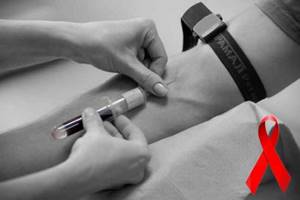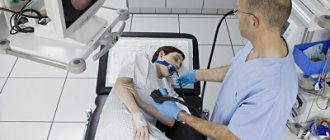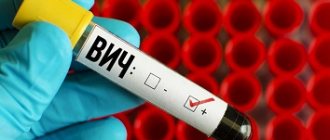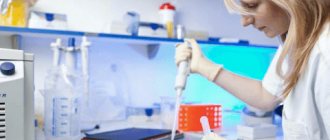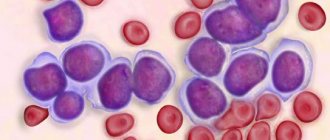Inspection after hazardous situations
In a situation of casual sexual contact with a partner whose HIV status is unknown, an informative determination of antibodies to HIV in the blood is possible only after three months. The first three months after HIV infection, there is a “window” period when antibodies to the virus are just beginning to be produced and their level is below the threshold value determined by the test systems.
A similar situation occurs if infection through the blood is suspected, for example, when injecting drugs with an unsterile syringe. After dangerous situations from the point of view of HIV infection, if the results of the first examination are negative, it is advisable to take repeated tests every three months for a year.
The first signs of HIV infection
Some people develop an acute infection, and then the first symptoms of HIV are a rash all over the body, plaque on the nasopharyngeal mucosa, sore throat, chills, and swollen lymph nodes. Such women are often diagnosed with infectious mononucleosis, acute respiratory infections or toxicosis-allergic reaction. This period of the disease is characterized by the presence of a positive or questionable ELISA result for VIS and often a negative or questionable immunoblot, since antibodies to some viral proteins have already been created, but not all; as a result, immunoblotting gives a negative answer.
To confirm the diagnosis at the zero stage of the disease, you need to do a blood test using PCR for HIV RNA.
The duration of acute infection usually lasts from 2 to 6 weeks. Subsequently, the symptoms regress, and HIV infection enters the stage without symptoms. And if at the stage of acute infection the disease is not detected (symptoms are not noticeable, the doctor did not show attentiveness during the examination, the patient did not inform about the likely risks), then in the future, detection of HIV infection is possible either by accident or when complaints arise. T-lymphocytes suffer the most from the influence of HIV in the patient’s body. As a result, the virus spreads throughout the body, it destroys T-lymphocytes, and their number decreases. In a healthy person, the presence of CD4 T lymphocytes in 1 micrometer of blood ranges from 600 to 1500 cells. For those who have HIV, the number may decrease to 300 cells or even 0. This decrease does not happen immediately.
When to check after a casual relationship
Of course, for each infection there are certain periods when it can be detected with a high degree of probability.
| № | Infection | Minimum detection period | Maximum detection period |
| 1 | Gonorrhea | 1–2 days | 7 days |
| 2 | Trichomoniasis | 2–5 days | 14 days |
| 3 | Chlamydia | 2–5 days | 3–4 weeks |
| 4 | Candidiasis | 2–3 days | 7 days |
| 5 | Syphilis | 7–10 days | 2 months |
| 6 | HIV | 2–3 weeks | 1 year |
| 7 | Hepatitis B | 3–4 weeks | 2 months |
| 8 | Mycoplasmosis, ureaplasmosis | 2–5 days | 14 days |
What do these terms depend on, and when do you still need to come for tests after unprotected sex?
The likelihood of early detection depends on the type of infection, the activity of the pathogen, the correctness of the collection of material for research and the choice of diagnostics.
That is, factors beyond the control of the doctor partially influence. But, basically, the correct examination and identification of the pathogen in the incubation period is entirely within the competence of the venereologist, and our doctors have long proven this to their patients, who managed to avoid serious complications of sexually transmitted diseases and infection of loved ones thanks to early and express diagnosis after accidental contact.
What does it mean to correctly collect the material? That is, taking smears or blood may be incorrect? Yes exactly. Therefore, we trust the selection of tests, scrapings and smears only to specialists, venereologists:
- Selecting a locus - the place from which a smear will be taken for infection. It depends on the type of sexual intercourse. If there was classic vaginal contact, then a scraping will be taken from the urethra and glans penis in men, and from the vagina and cervical canal in women. During anal sex, material is taken from the rectum, during oral sex, from the oropharynx and tongue. And there are many more nuances that depend on the routes of infection.
- Selecting the type of analysis for each specific infection. There are many types of laboratory diagnostics of STDs. The same infection can be determined using microscopy, PCR, culture, blood and urine tests. It is a competent specialist who will choose in a particular situation the method that will most accurately identify the microbe at an early stage.
- Selection of material collection method: scraping with a urogenital probe, Volkmann spoon, smear with a cotton probe, mucus aspiration, venous blood
- Safety and comfort for the patient of all medical procedures through the use of a painless technique for taking smears from the urethra.
Why should each of you get tested for HIV?
According to the Ministry of Health of the Russian Federation, the number of people living in Russia diagnosed with HIV in 2021 exceeded 1 million.
A million people is like the whole of Voronezh. Or all of Perm. Or Krasnodar. Surely, at the same time, the majority of Perm, Voronezh and Krasnodar residents, and, what’s more, the majority of Russians think that HIV infection is not about them.
The bad news: Even if you don't associate yourself with the people most vulnerable to HIV infection - which includes drug users, men who have sex with men, and people who engage in commercial sex - this alone will not protect you . And the cross will not protect, and neither will your individual marital fidelity.
Apteka.ru explains why there are no people invulnerable to HIV infection and how to actually protect yourself from it.
Ordinary people in relationships or marriages
Let's say you are a middle-aged woman or man. Or not average, but younger or older, it doesn’t matter. And biological sex is not so significant - we are all in the same boat.
Let's say you don't use drugs and aren't involved in prostitution. You work or do housework, raise children or are just planning. Now you have a permanent sexual partner, a stable relationship. Or they don’t exist, but they were (or will be, who knows). It would seem, why worry?
But why. Life is different, anything can happen. Let's say you actually once had unprotected sex. That's how it happened. Perhaps this did not have any visible consequences. Maybe a long-term relationship grew from this. But you do not know the HIV status of the partner with whom you did not use a condom. And after that they did not take an HIV test themselves.
So: this is risky behavior.
You can only have unprotected sex with a person in whose health you are confident. If your sexual partner does not use a condom with you, it may be his usual behavior and he has not used one before with other people. And who can vouch for his former partners?
We do not want to raise doubts in you about the fidelity or honesty of your partner, but only remind you that you need to assess and, if possible, eliminate risks.
And by the way: people who want or like to use condoms do not exist. That is, do not expect to shift this responsibility to your partner - you need to take it upon yourself. This is not a matter of desire or love for a condom, but solely a matter of your health and safety. Choose a suitable brand and size from the pharmacy assortment so that it does not press or fall off anywhere, and then sex will not lose quality.
Pregnant women
Do you know how to measure the HIV epidemic? Based on the number of HIV-infected pregnant women. These are precisely the people who are strongly recommended to be tested for HIV at least three times during pregnancy - so that, if an infection is suddenly detected, the woman can begin to treat the woman with antiretroviral therapy and prevent the transmission of HIV to the child.
Therefore, if you are pregnant, do not refuse HIV tests when your gynecologist offers them to you.
Yes, the news about HIV infection during pregnancy is so-so news, but this is a case when it is better to know than not to know.
Modern therapy for the mother makes it possible to prevent infection of the child and maintain her health until old age - the main thing is to start treatment and not avoid tests.
But I'm not a drug addict
The topic of drugs is so taboo in society that it is difficult to talk about them calmly. However, surveys show that many people have used drugs of one kind or another in one way or another.
Perhaps the use did not become systemic and did not develop into addiction, but this experience is a risk in terms of HIV infection. For example, because in an altered state of consciousness people do not always think about the safety of sex. And injecting drugs with a non-sterile syringe shared by several people or from a common container is itself a risk for HIV infection.
Considering that a person often cannot admit to using drugs, and the use may not have any visible consequences, by having unprotected sex with him, you are incurring the same health risks that he could expose himself to. Therefore, we repeat: a condom - until the circumstances are clarified.
By the way, few people know that a person who responsibly takes antiretroviral therapy (special medications that inhibit the development of HIV infection) cannot transmit the virus to anyone else, even through unprotected sex.
And in general, the quality of his life is not fundamentally different from the quality of life of a person without HIV: sports, fishing, travel, work, healthy children - underline what is necessary. But to start treatment, you must first get tested. And without treatment, deterioration of the condition is inevitable until death.
Where and why to get tested for HIV
A million HIV-positive residents of Russia is a lot. At the same time, HIV is one of the most easily controlled infections: it is enough to block the transmission routes and treat everyone who is already infected.
That is, the state needs to invest in sex education, affordable condoms and provide medicines to everyone in need. But while it doesn’t quite cope, you need to take care of yourself.
So, first of all, find out your HIV status as soon as possible. You can get tested for free:
— according to the compulsory medical insurance policy and passport at the clinic (with a referral from a therapist); - at the local AIDS Center; - in any commercial laboratory for money.
You can also find a rapid testing service in your city (HIV service non-profit organizations often do this) or find out when an HIV testing campaign will be held in the city (the all-Russian #STOPHIVAIDS campaign usually takes place on the eve of December 1 and in May in large populated areas ).
HIV tests. High standards of laboratory research
In Russia, there is an unfavorable epidemiological situation with HIV infection. Therefore, laboratory tests for HIV should be considered as a means of preventing AIDS and reducing the incidence of transmission of infection. Modern laboratory diagnostic methods used in CMD make it possible to detect HIV infection with high diagnostic accuracy.
Anonymous HIV tests
At the Center for Molecular Diagnostics (CMD), you can take an HIV test anonymously.
HIV analysis in CMD is:
- Serological diagnosis: determination of HIV antibodies and capsid antigen of the virus (p24) in the blood by ELISA (enzyme-linked immunosorbent assay) with subsequent confirmation of positive results by immunoblotting (IB) in accordance with the Sanitary and Epidemiological Rules SP 3.1.5.2826-10 “Prevention of HIV Infection” "(2011);
- along with the serological diagnostic technique - the use of the polymerase chain reaction (PCR) method: identification of the genetic material of the virus (nucleic acids) in accordance with the “Methodological recommendations for conducting examinations for HIV infection”, approved by the Ministry of Health and Social Development of the Russian Federation on August 6, 2007;
- use of ultrasensitive methods for diagnosing HIV infection;
- guaranteed anonymity;
- efficiency of obtaining results.
Symptoms of HIV infection
During the first weeks after infection, HIV infection may manifest itself with nonspecific symptoms: weakness, fatigue, fever, inflammation of the lymph nodes, intestinal disorders, loss of appetite, and skin rash. The severity of these symptoms decreases, and over time they may completely disappear. A long stage of latent HIV infection begins, which is practically asymptomatic. This period in patients with HIV infection lasts 8-10 years and the disease can only be detected by taking an HIV test (AIDS test).
A timely anonymous HIV test allows you to buy time for the disease, significantly increasing the patient’s chances of effective antiretroviral therapy. This is the best remedy for constant doubts about your own health. You can be tested for HIV and hepatitis at the same time.
Basic measures to prevent HIV infection
The source of HIV infection is people infected with HIV at any stage of the disease, even the earliest.
Since no vaccine has been developed to prevent HIV infection, any person should follow fairly simple rules. The main thing is to prevent HIV infection.
First of all, a healthy lifestyle can already be considered as AIDS prevention. And, of course, abstaining from injecting drug use and casual sex, and using barrier contraception are extremely important measures to prevent HIV infection.
When to get tested for HIV?
If you have the slightest suspicion of possible infection, you should immediately take an HIV test. The Center for Molecular Diagnostics (CMD) conducts HIV tests using various methods: detection of antibodies to HIV and p24 antigen by ELISA, and PCR analysis for HIV. It is also possible to donate blood for HIV and hepatitis.
Where can I get an HIV test?
You can donate blood for HIV testing anonymously at the Center for Molecular Diagnostics (CMD).
By taking a blood test for HIV and hepatitis, you receive a guarantee of complete anonymity and medical confidentiality. The time it takes to perform an HIV test depends on the diagnostic method used. An HIV antibody test is performed within 1 calendar day, PCR testing - from 2 to 7 calendar days.
What tests need to be taken after an unprotected act?
It all depends on the specific situation. If a partner has been checked and a certain infection has been detected, then it must be tested for it unambiguously and preferably using all possible laboratory diagnostic methods.
If it is not known what infection you might have contracted, then you will have to do a full range of tests for STDs. These complexes are available in our clinic.
Symptoms of a sexually transmitted disease that have already appeared make the choice of tests somewhat easier, but again this does not exclude testing for other STIs that may still be in the incubation period.
Usually, after accidental contact, they are tested for syphilis, HIV, viral hepatitis, gonorrhea, trichomoniasis, chlamydia, mycoplasmosis, ureaplasmosis, gardnerellosis, candidiasis, herpes, HPV.
Each infection has its own group of tests that are a priority for detection in the early stages.
We have tried to summarize all the necessary information in a separate table, which will help you navigate among this abundance of diagnostic methods. But, of course, you should not schedule an examination for yourself before consulting a doctor.
The first signs of HIV infection
Gradually and slowly (usually over two years) the immune system begins to fail. A malfunction of the immune system leads to the body becoming more vulnerable to infections and tumors. Bacterial and viral infections develop first. In the early stages, signs of the skin and mucous membranes, as well as general symptoms of the disease, are most often observed. The first signs are:
- general fatigue and weakness,
- weight loss,
- dry skin,
- the presence of various rashes, including the frequency of recurring herpes viral infections,
- growth of peripheral lymph nodes,
- recurring fungal infection of the skin and mucous membranes,
- nail fungus.
If you also have the above symptoms, then you do not immediately need to diagnose yourself with HIV and panic. These are only the first signs of a general poor state of the body, and can be characterized by many other diseases. But taking an HIV test in this case will not be superfluous.
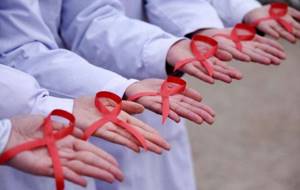
How to properly prepare for HIV testing
Before taking a blood test for HIV, it is recommended to visit a doctor who will conduct an initial consultation. In general, the doctor provides such therapeutic and informational services before each test that is carried out for the presence of any disease:
- Informing about the process of conducting a blood test for HIV (hepatitis);
- Purpose of preparation for analysis, informing about how long it lasts;
- Drawing up a list of permitted/prohibited products;
- Collecting medical history, obtaining information about whether a person is taking medications;
- Conducting a therapeutic examination, measuring biological parameters before the test;
- If necessary, assist in providing psychological assistance.
For the study, about 5 ml of biomaterial is taken from a vein in the elbow bend of the arm. In this case, the patient sits or reclines on a therapeutic couch. Blood testing for HIV must be done on an empty stomach, and the procedure itself is recommended to be completed before lunch.
Now let's talk about the conditions that must be observed for some time before testing for HIV and hepatitis, when the result will be most accurate. The following preparation is required:
- On the day of the biomaterial collection procedure, stop taking medications (if possible). The infectious disease specialist should be informed about taking medications at the appointment;
- For at least 3 days before donating blood, you should stop drinking alcohol and limit smoking. You can drink alcohol only after the procedure;
- Strength training (heavy physical activity) is not recommended before testing;
- The evening meal on the eve of the procedure should be light (low in fat), dinner should not be heavy. 8-12 hours before the actual blood sampling for analysis, do not eat at all;
- Girls are not recommended to undergo testing during menstruation;
- You should not do physiotherapeutic procedures or X-rays during the preparation for diagnosis;
- Prepare mentally for the procedure of collecting biomaterial, avoid sudden mood swings and strong emotional experiences.
- Before the procedure, you need to calm down, not stress yourself out, it is important to get your heartbeat and frayed nerves in order.
As for water, you can drink water both in the evening and before donating blood; clean drinking water does not affect the composition of the blood. But you should refuse any food, because at least 8 hours must pass from the last meal before testing.
Very often, the presence of HIV infection is accompanied by a pathological liver disease – hepatitis. Doctors call this interaction a combined infection. What these two diseases have in common is that their routes of entry into the body are almost identical. Therefore, it would be advisable to conduct two tests at once, since the detection of hepatitis and immunodeficiency virus diseases is almost the same.
